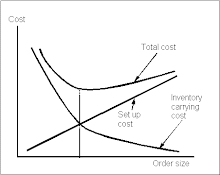Wednesday, December 3, 2008
Integer ratio policy
The integer ratio policy suggests that the warehouse inventory Qw should be an integer multiple of the retailer inventory Qr, Qw = nQr. The intuition behind this is that would achieve minimal inventory holding cost. But I'm curious about a mathematical proof.
- Bing Liu
stupid question about service levels
In class, we talked about two types of services.
- probability of not stocking out
- probaility of demand met from stock
- Bing Liu
Coordinated policy
Today in the last class meeting of this course, we talked about the coordination of retailer and warehouse inventories in order to achieve overall optimality. That reminds me of a talk a short while ago about the coordination between suppliers and customers. But that paper concludes that the overall optimal strategy benefits the supplier but may hurt the customer. The supplier should compensate the extra cost incurred at the customer to encourage coordination.
I believe there is the same problem to multi-echlon inventory managments although this might be under the unified financial administration of the same company. The warehouse management should take actions to encourage the retailer to coordinate for a win-win strategy.
-Bing Liu
Sunday, November 30, 2008
Great Article on Starting Businesses in Logistics
I ran across this article in BusinessWeek, and thought it would be good to share with everyone:
http://www.businessweek.com/smallbiz/content/oct2008/sb20081024_482729.htm
It offers an interesting view on logistics businesses, which will be the career path of many in our class.
Does everyone agree that the business is "built around personal relationships and trust"?
-Andrew Freeman
http://www.businessweek.com/smallbiz/content/oct2008/sb20081024_482729.htm
It offers an interesting view on logistics businesses, which will be the career path of many in our class.
Does everyone agree that the business is "built around personal relationships and trust"?
-Andrew Freeman
Vote on Blogging and Inventory Management
Now that the semester is almost over, I think that it is an appropriate time for our class to assess the value of this blogging assignment.
Personally, I think that the blogs did not achieve Dr. Keskin's desired results set forth at the beginning of the assingment. There are probably many reasons for the outcome; however, I would suggest that future classes only maintain one blog as opposed to eight different blogs.
Does anyone else agree? What about a conflicting opinion?
-Andrew Freeman
Personally, I think that the blogs did not achieve Dr. Keskin's desired results set forth at the beginning of the assingment. There are probably many reasons for the outcome; however, I would suggest that future classes only maintain one blog as opposed to eight different blogs.
Does anyone else agree? What about a conflicting opinion?
-Andrew Freeman
Monday, November 17, 2008
Thoughts on "Human" Inventory
Citi Bank announced this morning that they would be cutting approxiamately 50,000 jobs. This is just one example of a company cutting jobs as a result of the stagnating economy.
I believe that we can look at this situation and apply some of inventory management principles (however, this opinion might be far from the truth).
For instance, these companies are drastically reducing their levels of human capital, which means they will have to do more with less. They are basically trying to run a leaner organization, which could possibly be related to a company reducing the amount of inventory they carry by employing lean concepts.
On the other hand, there is also an increasing supply of unemployed workers in the marketplace. These unemployed individuals are probably willing to work for a smaller salary in light of these uncertain economic times. If we consider the workforce as a cost, then companies can now take advantage of acquiring their workforce at a reduced rate.
Does anyone have any thoughts or opinions on this subject???
-Andrew Freeman
I believe that we can look at this situation and apply some of inventory management principles (however, this opinion might be far from the truth).
For instance, these companies are drastically reducing their levels of human capital, which means they will have to do more with less. They are basically trying to run a leaner organization, which could possibly be related to a company reducing the amount of inventory they carry by employing lean concepts.
On the other hand, there is also an increasing supply of unemployed workers in the marketplace. These unemployed individuals are probably willing to work for a smaller salary in light of these uncertain economic times. If we consider the workforce as a cost, then companies can now take advantage of acquiring their workforce at a reduced rate.
Does anyone have any thoughts or opinions on this subject???
-Andrew Freeman
Subscribe to:
Comments (Atom)
